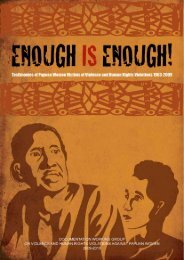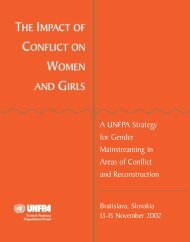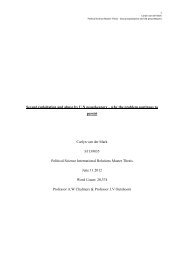Download the full report - Human Rights Watch
Download the full report - Human Rights Watch
Download the full report - Human Rights Watch
You also want an ePaper? Increase the reach of your titles
YUMPU automatically turns print PDFs into web optimized ePapers that Google loves.
<strong>Human</strong> <strong>Rights</strong> <strong>Watch</strong> that he and o<strong>the</strong>r detainees were raped repeatedly at night by KK, a<br />
police officer from <strong>the</strong> Colombo Crime Division at his room in <strong>the</strong> Dehiwela police station in<br />
June 2008. “Everybody knew that when he [KK] takes someone out of <strong>the</strong> cell,” PR said.<br />
“He will rape <strong>the</strong>m.” 70<br />
Both men and women were raped. Rape often occurred in cells at night or in interrogation<br />
rooms in which o<strong>the</strong>r acts of torture took place. It was carried out by prison guards and<br />
officers, often repeatedly and often by more than one individual. Frequently <strong>the</strong><br />
perpetrators had been involved in interrogating <strong>the</strong> victims during <strong>the</strong> day, had used some<br />
form of sexual violence during questioning, and returned later for more serious violence.<br />
Sexual violence included groping, kicking and squeezing genitals, biting buttocks and<br />
breasts, and burning sensitive areas like inner thighs and breasts with cigarettes.<br />
The patterns across perpetrators, places of detention, and interrogation practices noted<br />
above strongly suggest that rape and o<strong>the</strong>r sexual violence was a systematic practice that<br />
was known or should have been known at <strong>the</strong> highest levels of <strong>the</strong> state security apparatus.<br />
Victims<br />
The predominately ethnic Tamil detainees we spoke with who alleged that <strong>the</strong>y were raped<br />
and o<strong>the</strong>rwise sexually abused while in <strong>the</strong> custody of Sri Lankan security forces covered a<br />
broad spectrum. They included men and women, ranged in age from 16 to 50, and came<br />
both from Tamil areas of <strong>the</strong> north and east, and from Colombo and vicinity. Tamilspeaking<br />
Muslims were also among those so treated, and one case involving a Sinhalese<br />
woman suggests that <strong>the</strong> majority population has not been exempt from such<br />
mistreatment. While all were accused of being LTTE members or supporters, or were<br />
questioned about o<strong>the</strong>rs who had such involvement, most of <strong>the</strong> individuals we spoke to<br />
denied direct involvement in <strong>the</strong> LTTE but admitted links through spouses and relatives, or<br />
said <strong>the</strong>y had been forced to join <strong>the</strong> LTTE. No doubt in many cases <strong>the</strong> security forces<br />
realized <strong>the</strong> detainee was not responsible for any unlawful acts—yet continued <strong>the</strong>ir<br />
abusive treatment anyway. In any case, torture and o<strong>the</strong>r ill-treatment are prohibited under<br />
all circumstances, regardless of whe<strong>the</strong>r <strong>the</strong> victim may have violated <strong>the</strong> law.<br />
70<br />
<strong>Human</strong> <strong>Rights</strong> <strong>Watch</strong> interview with PR, January 28, 2012.<br />
“WE WILL TEACH YOU A LESSON” 34




![IANSA [PDF, 2MB] - PeaceWomen](https://img.yumpu.com/25206379/1/190x123/iansa-pdf-2mb-peacewomen.jpg?quality=85)
![Commitments Sample [PDF, 93KB] - PeaceWomen](https://img.yumpu.com/25206331/1/190x245/commitments-sample-pdf-93kb-peacewomen.jpg?quality=85)










![A Toolkit for Advocacy and Action [PDF, 260KB] - Peace Women](https://img.yumpu.com/25205989/1/190x245/a-toolkit-for-advocacy-and-action-pdf-260kb-peace-women.jpg?quality=85)